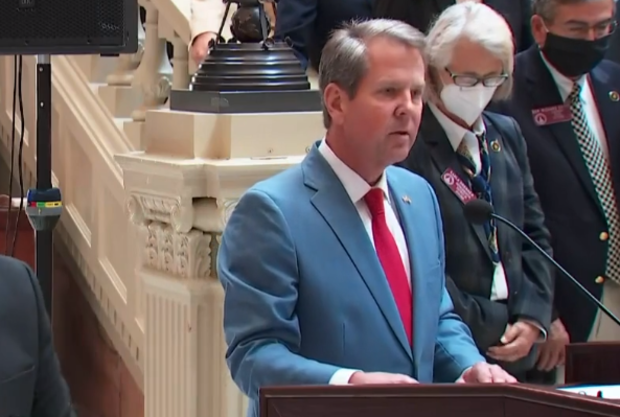Georgia governor signs landmark hate crimes bill into law
Georgia Governor Brian Kemp on Friday signed into law a landmark hates crime bill passed by the state legislature earlier this week. The new law mandates enhanced sentencing for defendants convicted of targeting a victim because of their "actual or perceived race, color, religion, national origin, sex, sexual orientation, gender, mental disability, or physical disability." That would mean additional potential prison time or fines on top of sentences for the type of crime for which the defendant was convicted, such as assault, manslaughter or murder.
Before the passage of HB426, Georgia was one of four states with no hate crimes law on its books. South Carolina, Wyoming and Arkansas remain without the legislation. Some advocates also include Indiana on the list, calling a law passed in that state last year "problematically broad."
Advocates have pushed for a hate crimes law in Georgia for decades, but the effort gained newfound resurgence following the February killing of Ahmaud Arbery, a black man who was pursued by two white men and shot dead as he jogged through a Brunswick neighborhood.
Kemp said the signing of the new law is a "milestone worth applauding." Georgia Democratic Rep. Calvin Smyre called it a "defining moment" in Georgia's history.
"Ahmaud Arbery's death will not be in vain as an example of what we are doing here today," Smyre said.
Three people have been indicted on murder charges in Arbery's death, and a state investigator has testified that one of the defendants, Travis McMichael, was heard using a racial slur as Arbery lay dying. A local prosecutor said this week that hate crime penalty enhancements are not an option in the case because the new law cannot be applied retroactively.
The Department of Justice, which has authority to bring federal hate crime charges, is also investigating.
Though both Republicans and Democrats stressed the importance of passing hate crimes legislation, the bill has not been without controversy. Democrats balked when Senate Republicans amended the bill to extend hate crime protections to law enforcement and first responders. Critics said the addition diluted the symbolic nature of hate crime legislation, which is typically intended to send a strong message condemning hate that has historically plagued marginalized communities in the U.S.
The first responders amendment was later struck from the bill in a bipartisan compromise, but some protections for law enforcement were folded into another bill that also passed the legislature, HB838. That proposed legislation would create a "bill of rights" for officers under investigation, and would add additional penalties for people convicted of targeting a firefighter, police officer or paramedic specifically because of their profession. It has been forwarded to Kemp and will become law if he signs it.
In a statement, the Democratic Party of Georgia said Republicans "forced through" HB838 even though law enforcement officials are already afforded protections under state law and "are all too often at the center of violence against the marginalized Georgians that the hate crimes law is looking to protect."
The bill's passage came the same day as the funeral for Rayshard Brooks, a black man who was shot dead by an Atlanta officer while fleeing with his Taser.
"We are thrilled that this [hate crimes] law has finally passed after years of advocacy, but let's be clear — we will not forget that this bill only came to light after 14 years of delays under Republican leadership, the murder of black men before our eyes, and the pain of marginalized communities across our state," the Georgia Democrats' statement said.
Protesters who gathered at the bill signing ceremony Friday held up signs that read, "Veto HB838."
Arbery's mother Wanda Cooper-Jones, in a statement released through the Georgia NAACP, said "though we stand in full support of law enforcement, HB838 is more dangerous to our community than HB426 is good." Cooper-Jones has also advocated for a bill that would repeal Georgia's citizen's arrest law, and she said seeing the legislature instead prioritize HB838 "is heartbreaking and does not do justice for my son."





